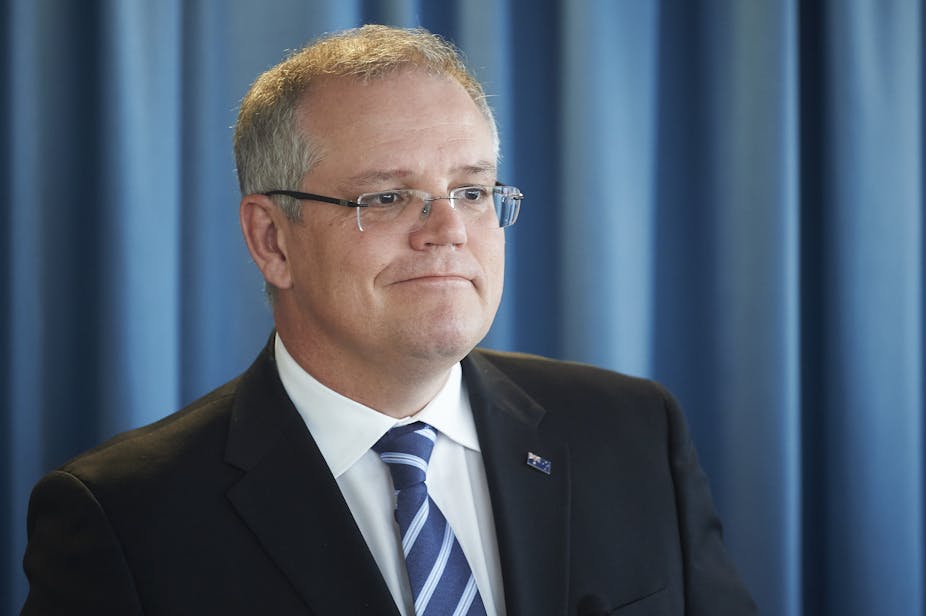There was a very revealing moment in Scott Morrison’s interview on Tuesday’s ABC 7.30 program about this week’s budget update.
Presenter Leigh Sales was pressing Morrison about the gap between the Coalition’s budget “emergency” debt-and-deficit rhetoric of a couple of years ago and the current situation, when the numbers are worse.
After dodging around, talking about the big job, global headwinds, the need to be realistic about the challenges, Morrison finally became frustrated with Sales trying to get him to address the change in rhetoric:
Well, you’re asking me about politics Leigh. You’re asking me about politics. What I’m talking about is what is actually happening with the budget.
Morrison’s approach is the clean slate one or, in different language, when the past is inconvenient it is another country. Never mind what the Coalition said before. Just listen to what it is saying today.
Of course different rules are applied to Labor. The Coalition has a good memory for the former government’s economic faults – though currently it is a bit harder to sound convincing about them, given this government’s own failures.
If in 2013 we had a “budget emergency” when Tony Abbott in his budget reply was lamenting a “$20 billion deficit”, what do we have now, with the deficit revised in the update to A$37.4 billion for this financial year?
Certainly, the government would say, not an “emergency”. Not that we had one in 2013, according to many economists at the time.
What we have, in Morrison’s folksy language, is akin to a pleasant family car trip:
It’s like going off on that summer holiday: you get in the car; you know where you’re going; you don’t put the passengers at risk; you get to your destination safely. Of course there will be people chiming in from the back seat like my kids always do, saying, ‘Are we there yet? Are we there yet?’ Well, we are going to get there and we’re going to get there with everybody on board.
If Wayne Swan or Chris Bowen had had us carefully driving along toward the elusive surplus, kids in the back, they’d have been ridiculed. That surplus has retreated further from the Coalition than it did from Labor. Anyone spy a petrol station?
One alarming aspect of Morrison’s refusal to be responsible for the Coalition’s past rhetoric is that it implies that he won’t necessarily accept the government being held to account for what is said now, or in the future.
So if he and his colleagues make certain claims and predictions at election time, which then turn out to be wrong – well, that was then, wasn’t it? Morrison will have moved on to whatever might become the new reality.
Yet that makes a nonsense of an election campaign. We all accept that things change over time. But if politicians can wipe away what they previously said so unequivocally, taking no responsibility for it, they are once again trashing the trust that is needed for a well-functioning political system.
Another part of Tuesday’s comments was decidedly odd.
Growth forecasts this financial year and next have been downgraded, but in their joint statement Morrison and Finance Minister Mathias Cormann said:
The inclusion of this more realistic outlook should be seen as a statement of confidence.
“More realistic”? Was the outlook in the budget not realistic at the time, or did it become unrealistic?
To declare that including what is a more pessimistic outlook should be regarded as a statement of confidence is bizarre. Anyway, what was the alternative? Not to include it?
Morrison has an inflated view of his, and the government’s, ability to control debates. We’ve seen this in the tax debate, where he wanted initially to keep public attention on the problem of income tax rates and bracket creep without focusing too early on the (nasty) solutions, but inevitably the talk quickly centred on what might happen to the GST.
With the budget update, Morrison now finds he and his colleagues potentially facing new battles with the Senate over some of the cuts that have been announced. And this when he will be absorbed in getting a tax package together.
Morrison came to the treasurer’s job with his own side and commentators predicting he would be a great deal more effective than his predecessor Joe Hockey.
Many would judge he has not so far lived up to the high expectations of him, partly because he thinks he can sell over-simplified narratives. It is still early days. Next year the real pressure will be on.

